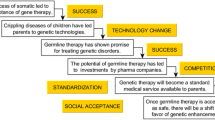Abstract
In the Ultimatum Game, two players are asked to split a prize. The first player, the proposer, makes an offer of how to split the prize. The second player, the responder, either accepts the offer, in which case the prize is split as agreed, or rejects it, in which case neither player receives anything. The rational strategy suggested by classical game theory is for the proposer to offer the smallest possible positive share and for the responder to accept. Humans do not play this way, however, and instead tend to offer 50% of the prize and to reject offers below 20%. Here we study the Ultimatum Game in an evolutionary context and show that empathy can lead to the evolution of fairness. Empathy means that individuals make offers which they themselves would be prepared to accept.
Similar content being viewed by others
References
Bethwaite, J. and P. Tompkinson (1996). The ultimatum game and non-selfish utility functions. J. Econ. Psychol. 17, 259–271.
Binmore, K. (2001). How and why did fairness norms evolve? Proc. British Acad. 110, 149–170.
Bolton, G. E. and A. Ockenfels (2000). A theory of equity, reciprocation and competition. Am. Econ. Rev. 90, 166–193.
Bolton, G. E. and R. Zwick (1995). Anonymity versus punishment in ultimatum bargaining. Game Econ. Behav. 10, 95–121.
Dieckmann, U. (1997). Can adaptive dynamics invade? Trends Ecol. Evol. 12, 128–131.
Fehr, E. and K. M. Schmidt (1999). A theory of fairness, competition and cooperation. Q. J. Econ. 114, 817–868.
Geritz, S. A. H., J. A. J. Metz, E. Kisdi and G. Meszena (1997). Dynamics of adaptation and evolutionary branching. Phys. Rev. Lett. 78, 2024–2027.
Geritz, S. A. H., E. Kisdi, G. Meszena and J. A. J. Metz (1998). Evolutionarily singular strategies and the adaptive growth and branching of the evolutionary tree. Evol. Ecol. 12, 35–37.
Güth, W., R. Schmittberger and B. Schwarze (1982). An experimental analysis of ultimatum bargaining. J. Econ. Behavior Organization 3, 367–388.
Güth, W. and R. Tietze (1990). Ultimatum bargaining behavior, a survey and comparison of experimental results. J. Econ. Psychol. 11, 417–449.
Hofbauer, J. and K. Sigmund (1998). Evolutionary Games and Population Dynamics, Cambridge: Cambridge University Press.
Kahnemann, D., J. L. Knetsch and R. Thaler (1986). Fairness and the assumptions of economics. J. Bus. 59, S258–S300.
Kirchsteiger, G. (1994). The role of envy in ultimatum games. J. Econ. Behavior Organisation 25, 373–389.
Metz, J. A. J., S. A. H. Geritz, F. J. Meszena, F. J. A. Jacobs and J. S. van Heerwaardenm (1996). Adaptive dynamics: a geometrical study of the consequences of nearly faithful reproduction, in Stochastic and Spatial Structures in Dynamical Systems, S. J. Van Strien and S. M. Verduyn Lunel (Eds), Amsterdam: North Holland, pp. 183–231.
Nowak, M. A., K. M. Page and K. Sigmund (2000). Fairness versus reason in the Ultimatum Game. Science 289, 1773–1775.
Nowak, M. A. and K. Sigmund (1990). The evolution of reactive strategies in iterated games. Acta Applicandae Math. 20, 247–265.
Page, K. M. and M. A. Nowak (2001). A generalized adaptive dynamics framework can describe the evolutionary Ultimatum Game. J. Theor. Biol. 209, 173–179.
Page, K. M., M. A. Nowak and K. Sigmund (2000). The spatial ultimatum game. Proc. Roy. Soc. Lond. B 267, 2177–2182.
Preston, S. D. and F. B. M. de Waal (2001). Empathy: Its ultimate and proximate bases. Behav. Brain Sci. (in press).
Roth, A. E., V. Prasknikar, M. Okuno-Fujiwara and S. Zamir (1991). Bargaining and market power in Jerusalem, Ljubljana, Pittsburgh and Tokyo. Am. Econ. Review 81, 1068–1095.
Roth, A. E. (1995). Bargaining experiments, in Handbook of Experimental Economics, J. Kagel and A. E. Roth (Eds), Princeton University Press.
Rubinstein, A. (1982). Perfect equilibrium in a bargaining model. Econometrica 50, 97–110.
Sigmund, K., E. Fehr and M. A. Nowak (2002). The economics of fair play. Sci. Am. 286, 82–87.
Thaler, R. H. (1988). The Ultimatum Game. J. Econ. Perspectives 2, 195–206.
Author information
Authors and Affiliations
Corresponding author
Rights and permissions
About this article
Cite this article
Page, K.M., Nowak, M.A. Empathy leads to fairness. Bull. Math. Biol. 64, 1101–1116 (2002). https://doi.org/10.1006/bulm.2002.0321
Received:
Accepted:
Issue Date:
DOI: https://doi.org/10.1006/bulm.2002.0321




